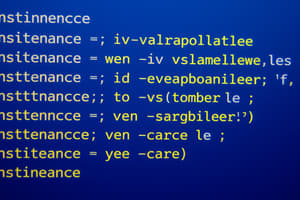Podcast
Questions and Answers
What is a class in programming?
What is a class in programming?
- Another type to store and manage data (correct)
- A subroutine to manipulate data
- A method to create an instance
- An object made from a blueprint
What are objects in programming?
What are objects in programming?
The software equivalent of a physical item that contains data and methods to manipulate that data.
What is an instance?
What is an instance?
One specific object created with a constructor method within a class.
What are instance variables?
What are instance variables?
What are instance methods?
What are instance methods?
What is a constructor method?
What is a constructor method?
What does the 'new' operator do?
What does the 'new' operator do?
What is a mutator method?
What is a mutator method?
What is an accessor method?
What is an accessor method?
Flashcards are hidden until you start studying
Study Notes
Classes and Objects
- Class serves as a template for creating objects, defining the properties and behaviors they contain.
- Often compared to a recipe or blueprint, it organizes data and methods.
Objects
- Objects represent physical items in software, encapsulating both data and methods for data manipulation.
- They serve as instances of classes, holding specific values and functionalities.
Instances
- An instance is a unique object created from a class using the constructor method.
- Represents a concrete realization of the class, akin to a specific version of an object.
Instance Variables
- Instance variables store the data specific to an object, essentially holding the object's state.
- Each object can have different values for its instance variables, defining its individuality.
Instance Methods
- Instance methods are functions defined within a class, enabling objects to manipulate and access their instance variables.
- They facilitate interaction with the object's data, enhancing functionality.
Constructor Method
- The constructor method is a special function invoked to create an instance of a class.
- Initializes the instance variables during the object's creation process.
Operator "new"
- The "new" operator is employed to instantiate an object, effectively calling the constructor method associated with the class.
- It allocates memory for the new object and prepares it for use.
Mutator Methods
- Mutator methods, often prefixed with "set," allow modification of instance variables.
- They provide a controlled way to change the state of an object.
Accessor Methods
- Accessor methods, commonly starting with "get," enable retrieval of an object's data without altering its state.
- They provide a mechanism for safe access to the instance variables, often called "getters."
Studying That Suits You
Use AI to generate personalized quizzes and flashcards to suit your learning preferences.




